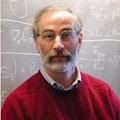Steven Zucker, Ph.D.
David and Lucile Packard Professor, Yale University
Steven W. Zucker is the David and Lucile Packard Professor at Yale University. He graduated from Carnegie Mellon University, obtained a Ph.D. at Drexel University, and did postdoctoral research in computer science with Azriel Rosenfeld at the University of Maryland. He joined McGill University in 1976, where he became professor of electrical engineering. From 1991 to 1996, he was also director of the program in Artificial Intelligence and Robotics at the Canadian Institute for Advanced Research. He moved to Yale in 1996, where he is currently professor of computer science and of biomedical engineering. He is also a member of the Interdepartmental Neuroscience Program and the Applied Mathematics Program, which he directed from 2003 to 2009. He was elected a fellow of the Canadian Institute for Advanced Research, a fellow of the Institute of Electrical and Electronics Engineers; a By-Fellow, Churchill College, Cambridge; and the Newton Institute for Mathematical Sciences. He was honored with the Siemens Award at the Institute of Electrical and Electronics Engineers Conference on Computer Vision and Pattern Recognition and was named an Allen Distinguished Investigator in 2013.
Zucker’s research is in computational neuroscience and computational biology. Seeking basic principles underlying information processing in the visual system, he pioneered the differential‐geometric view of early visual processing. At the network level, he introduced a game‐theoretic foundation for neural interaction, and is now focusing on how such networks could be learned. The goal is to reveal how activity‐dependent cortical plasticity could capture those high‐order statistical relationships in the natural world that are necessary to support complex, visually mediated behaviors. He remains fascinated by how mathematical ideas can inform seemingly unrelated problems, and is also working on a theory of vascular development in plants motivated by visual shape analysis and on collective behavior in bacteria motivated by game theory.
Past Project: Network properties and plasticity in high- and low-gain cortical states